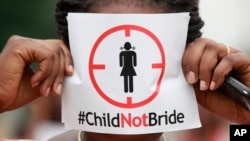The African Union Commission launched a campaign against child marriage two years ago, and it's trying to make it a priority for the continent’s heads of state.
The commissioner for social affairs, Sierra Leonean medical doctor Mustapha Sidiki Kaloko, said figures from 2014 suggest about a third of African females marry before they are 18, and many at age 15 or younger. In some countries, he told journalists Thursday, up to 75 percent of females marry before they turn 18.
"I think child marriage is sitting at the top of the table when you’re talking about harmful traditional practices," he said at an AU summit in Kigali. "It’s so important. It’s a little obscure." He said it doesn't get as much attention as female genital mutilation, "but believe me, its effects are probably equal or much, much worse."
Kaloko was referring to the fistulas, or vaginal tears developed by some young girls whose bodies are not ready for sexual intercourse and pregnancy.
"If they end up with a fistula, the first thing the husband does is kick them out of the house," Kaloko said. "They develop vesicovaginal fistulas or rectovaginal fistulas — they’re either smelling of urine or feces all the time, and society cannot tolerate them. All this suffering because of a problem that’s not their own."
The commissioner rejected one reporter’s suggestion that unwanted pregnancies were a higher-priority problem. A 15-year-old bride, Kaloko said, "has nowhere to run to. She can’t run to her mother because the mother will simply say, 'Go back there' — because the mother herself most probably was married at the age of 15."
Olawale Maiyegun, director of the AU’s social affairs department, called for more action on both issues.
"There is a failure on the part of society to meet what we call unmet needs of young people — family planning, contraceptives — so whether it’s the campaign against child marriage or meeting the needs for family planning and contraceptives, then we need to do more," Maiyegun said.
Kaloko said the campaign against child marriage needs to build at the village level. He said several partners were strongly supporting it — among others, Canada, Britain and the Ford Foundation — and he stressed there will be serious monitoring and evaluation of its impact.




